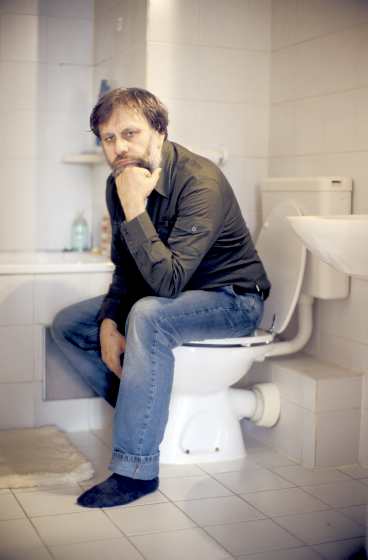 Recognized the world over as one of the preeminent social theorists to emerge at the end of the 20th century, Slavoj Zizek is one of the rare intellectuals who has made the jump from academic authority to cultural celebrity. Recently he made a stir in the academic world by writing captions for photos in an Abercrombie & Fitch catalog. Questioned as to whether this was an appropriate application of his considerable intellectual talents, Zizek replied that he would rather make money writing ad copy than "kissing ass to get a tenured post." A charismatic and engaging speaker, Zizek unapologetically simplifies the content of his work during public lectures and television appearances, often making comments that seem contradictory to his published materials (if you're looking to waste some time, a YouTube search of 'slavoj zizek' yields a wealth of entertaining and thought provoking clips).
Recognized the world over as one of the preeminent social theorists to emerge at the end of the 20th century, Slavoj Zizek is one of the rare intellectuals who has made the jump from academic authority to cultural celebrity. Recently he made a stir in the academic world by writing captions for photos in an Abercrombie & Fitch catalog. Questioned as to whether this was an appropriate application of his considerable intellectual talents, Zizek replied that he would rather make money writing ad copy than "kissing ass to get a tenured post." A charismatic and engaging speaker, Zizek unapologetically simplifies the content of his work during public lectures and television appearances, often making comments that seem contradictory to his published materials (if you're looking to waste some time, a YouTube search of 'slavoj zizek' yields a wealth of entertaining and thought provoking clips).Zizek is the subject of numerous profiles and videos (I had to watch Zizek! in a class and would highly recommend it) and the latest film issue of The Believer magazine includes a DVD of part one of his recent film The Pervert's Guide to Cinema. Originally broadcast on British television, The Pervert's Guide provides a crash course on psychoanalytic film criticism as well as Zizek's own thoughts on human desire and the nature of reality. He covers films as diverse as Vertigo and Revenge of the Sith and his commentary comes across more like astute observations from an enthusiastic fan than serious criticism from one of the world's most renowned thinkers. You might not learn anything profound about any of these films, but watching Zizek deliver sweaty, over-enunciated commentary from inside faithful set recreations of the scenes being analyzed is wildly entertaining. He delivers a lecture on the superego from Norman Bates' basement and sits casually on the hotel toilet from The Conversation whilst discussing perception and desire.
Currently unavailable on Netflix, you can get the first hour of The Pervert's Guide to Cinema with a copy of The Believer (the issue also has a great feature breaking down the budget of a feature film) or seek out a copy online.
I've included a sample clip below, and if this is your type of thing, the entire film is available on YouTube (I'm too lazy to stitch together all 15 segments into a playlist here on The Molly; just search "perverts guide to cinema" and they should all come up)
FREUD VIA HITCHCOCK AND THE MARX BROS

3 comments:
I thoroughly enjoyed this documentary. Saying nothing of his charisma, Zizek's rapid-fire ideas are provocative and, perhaps most importantly, kinetic.
The part where he's sitting on the toilet likening the act of watching a film screen to that of watching a toilet bowl waiting for something to re-emerge elicited a hearty chuckle.
I especially liked his comment on Dogville, the idea of irony not being used to undermine or engender disbelief, but to actually provide or help create a novel structure for belief.
The Freudian-Lacanian analytic apparatus is potent and it appears that Zizek has mastered its implementation with only an ounce of apotheosis.
I agree with much he has to say about fiction and cinema, but as you say Josh, nothing too profound or revelatory. In addition, his approach is sometimes too shrewd and clever, threatening to obstruct or occlude "authentic" experience. But the scare quotes are endemic to his approach, so there you go.
Also - I LOVE the scene when he's watering his flowers and he remarks, in agreeance with Montague Withnail, that flowers are tarts, prostitutes for the bees.
Thanks for the post Josh.
The flowers scene hit me as well and I was compelled to watch Withnail. In a fit of nostalgia I downloaded the King Curtis track that plays over the opening scene as well.
I see you queued up both Zizek! and Dogville on your netflix. We'll have to discuss.
Gracias for highlighting Zizek. Prior to your post, I did not know he existed.
Post a Comment